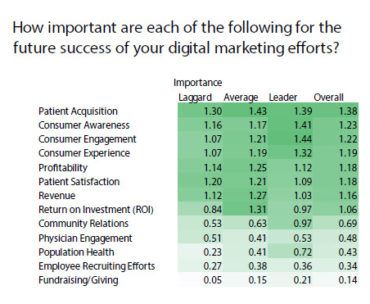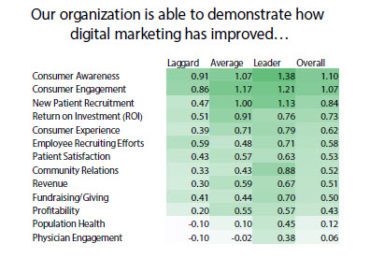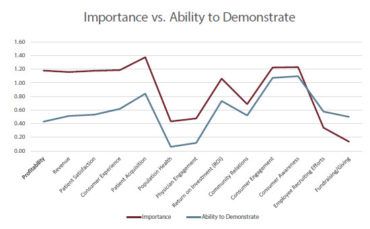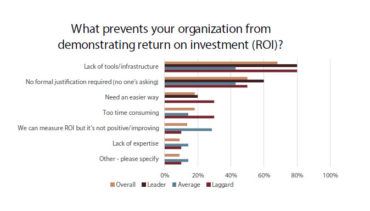If ROI is so important, why aren’t more healthcare marketers tracking it? It could be because no one is asking…
As marketers work to solidify their seat at the decision-making table and secure the budgets required for modern MarTech stacks, the need to justify those investments and show that they’re performing becomes more and more important. That’s why as we look at top healthcare digital marketing goals for our annual survey of the industry, we take a bit of a deep dive around tracking that ever-elusive ROI. Here’s what we found this year – and how it compares to last year’s results.
How important is ROI really?
As we look at the relative importance of different digital marketing goals overall, ROI (and most other financially-minded goals) falls in the middle of the pack, trailing more patient and consumer-focused goals but still ahead of goals relating to other audiences such as physician engagement, HR recruiting, and fundraising.
This isn’t equally true in all organizations. When looking at how digital leaders approach those goals compared to the average or laggards (respondents self-select into a segment based on how they view their digital marketing initiatives as compared to tactics), we see that financial measures, including ROI, are top goals for average organizations, falling just after patient acquisition.
It seems that digital leaders have more credibility and are less pressured to demonstrate a return on every digital marketing investment. Lagging organizations often lack the tools and infrastructure to measure, so it’s not an expectation. Organizations in the middle of the pack, digitally speaking, find themselves under the most pressure to deliver measurable ROI on their marketing investments.

Scale: -2 to +2
Ability to Demonstrate Impact of ROI
It’s one thing to have a goal and quite another to be able to deliver on it. As we looked at how respondents are able to demonstrate that digital marketing is improving performance on those goals, a different story emerges. Leaders are also far more capable when it comes to demonstrating the impact of digital marketing on most of the listed goals, but not on ROI where those average organizations who are under pressure to deliver ROI are more able to do so.
That said, no goal showed as much year over year improvement as the ability to demonstrate ROI — which more than doubled — from .35 last year to .72 this year.

Scale: -2 to +2
Top Goals vs. Ability to Demonstrate Impact
Next, let’s look at the gap between organizations’ goal importance and their ability to demonstrate how digital marketing has impacted those goals.
In 2019, the financial metrics led this gap by a wide margin. This year is more mixed — profitability still remains elusive despite its importance, but patient satisfaction makes its way into the second position ahead of revenue.
However, ROI has closed the gap significantly and falls to the middle of the pack.

ROI Reporting
Although the ability to demonstrate ROI has improved in the last year, the lack of tools continues to lead the list of reasons why healthcare organizations fail to report this metric. The most interesting result this year, as it was in 2019, was reason #2 – organizations aren’t reporting ROI, in part, because no one is asking.
In fact, this year the percentage of respondents indicating a lack of interest in ROI has grown from 33% to 48%. On top of that, organizations that can measure ROI but it’s just positive has grown to 16% this year from 1.68% last year!

What’s this mean for you?
So it seems a lot of healthcare marketers are getting better at tracking ROI, but many of their executives still aren’t asking for it. It’s like the tree in the forest – if you track and no one’s there to see it, did it really happen?
The risk, of course, is that many marketers may be asked for the first time to justify their investments in a different way in this year of pandemic-induced financial woes and unprecedented budget cuts. We strongly encourage healthcare marketers to work towards measuring ROI regardless if they’re being asked to do so and share this with stakeholders along with the other marketing metrics – and as marketing will be at the forefront of helping to recoup revenue after a year of shutdowns, you will be at a critical role to do just that.
Learn more in the full report
Be sure to download the full survey results report today and learn more about what success measurements today’s healthcare marketers are working towards and what barriers get in the way. If you need help setting and achieving digital marketing goals for your team, we can help.

